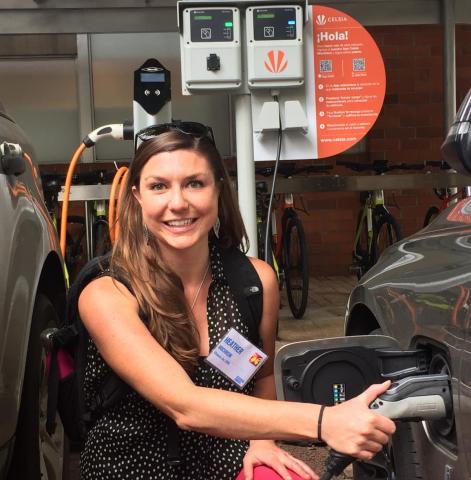As the co-founder and CEO of EVmatch, a peer-to-peer network for sharing private electric vehicle charging stations, Heather Hochrein measures her business in a number of ways. Financial health and growth make the list, of course, but she also tracks how much EVmatch is reducing carbon dioxide emissions and serving customers in underserved communities. It’s all part of the ambitious, data-driven, solutions-based philosophy at the heart of her company.
“I wasn’t planning to start a tech company out of grad school,” she says, “but I looked at the data for greenhouse gas emissions by sector and the barriers to adoption for electric vehicles, and I saw there were means to address this massive problem. I’m a person who likes to propose solutions rather than focus on the problem. I think that’s characteristic of any Bren student.”

Prior to Bren, Heather had already been tackling the problems of energy use and climate change. After earning an undergraduate degree in molecular environmental biology with a focus on human and environmental health, she ran energy efficiency programs in the Bay Area. After a few years, she started to look for ways to accelerate her career in the clean energy sector. Bren’s programs made it an obvious choice to her for her for graduate studies: the Eco-Entrepreneurship focus, in particular, appealed to her as an opportunity to develop her skills.
“For an Eco-E project, you come up with your own business idea and you test it,” she says. “You talk to prospective customers, you interview industry experts, you collect a lot of data. I thought there would be a lot of valuable skills from that that I could apply to consulting or government or non-profit work. Then momentum grew for EVmatch. So I use it here. We apply that same process when we consider building a new feature or approaching a new customer segment.”
Bren supported EVmatch early on with a grant from the State of California that helped us reach our minimal viable product. And two of my earliest investors and advisors were Bren alumni. It was great to have that early support.
Building momentum for a startup, of course, is an enormous effort. As part of the Eco-Entrepreneurship program, Heather’s team took part in business plan competitions, where they were able to secure some initial funding. She then took the skills she learned of presenting her ideas, handling questions, and networking to other forums. She reached out to her network in Berkeley, worked with the Los Angeles Cleantech Incubator, leveraged an accelerator program for female founders called MergeLane in Colorado, and more.
“Bren supported EVmatch early on with a grant from the State of California that helped us reach our minimal viable product. And two of my earliest investors and advisors were Bren alumni,” she says. “It was great to have that early support. From there, I worked to extend out my network to find angel investors and venture capital so we could really grow.”
As her business has expanded, Heather has stayed in close contact with the Bren Career Development team. EVmatch has hosted several Bren interns interested in getting experience at a clean energy startup. The Career Development team’s careful consideration of internships from both the perspective of the organization and student helps ensure both sides benefit: in one instance, EVmatch was able to hire a Bren intern as a full-time employee.
From human resources to product development, Heather notes she is ultimately responsible for every aspect of her company. The work is intense, but for her, it has been well worth it.
“I’m grateful because at Bren, I basically got to work in the electric vehicle sector for a year and a half,” she says. “I learned a lot about that sector, and it was really fun for me because I got to work on exactly was I was interested in. I feel so fortunate that I got to really work on something that I was passionate about—and I continue to have that opportunity every day.”
For students considering their own path at Bren, she advises them to make the most of the opportunity to customize their experience. “I’d encourage students to consider building their own project to ensure what they work on is something they really want to learn about,” she says. “It’s really valuable for your career if you can walk out with a couple skills or a particular sector that you really have expertise in. It’s very marketable.”
